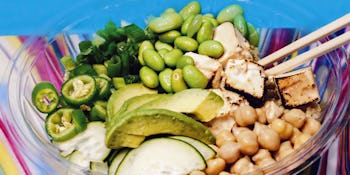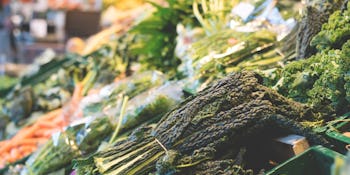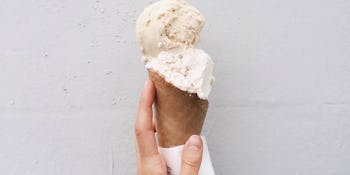Interview: Pressing “refresh” on agua fresca with Victor Guardiola
Victor and Jordan set out to honor the tradition of agua fresca while creating a Better-For-You light and refreshing beverage. Learn how they did it.

Victor Guardiola (pictured right) and Jordan Hicks (pictured left) founded Bawí with a passion for native Mexican food and beverage. Moving to the United States from Mexico in the early 2000s, Victor left part of his heritage behind. Still, he never lost his love for Mexico’s native flavors. Jordan found his passion working in Austin's food and beverage industry from a young age.
The pair collaborated to craft a Better-for-You agua fresca that is “refreshingly authentic.” The sparkling, fruit-based drink is low calorie and low sugar but high in authentic Mexican-American flavor. We interviewed Victor about his and Jordan’s experience creating Bawí as a part of our Longhorn Entrepreneur series.
—
How did you come up with the idea?
Victor Guardiola
Jordan Hicks, my cofounder and friend, brought up an idea of making a bottled agua fresca, and I immediately became interested in the idea. We had discussed entrepreneurial projects in the past, and I knew he would be a great cofounder. At the same time, I was taking Marissa’s course, the Food & Beverage Entrepreneurship Practicum, and discussed the concept with her. Marissa was really excited about the idea and said it had much more potential than the idea I entered the class with—she was totally right.
The class really helped refine the concept. I was personally able to add a lot of value to the initial concept of a bottled agua fresca. Some attributes that arose were making Bawí low-calorie and sparkling, which are now key product features that make us unique.
The class really made it less a concept and more of a business by quickly testing the validity of any assumptions we had by conducting primary and secondary market research.
How did UT play a role in your journey?
Victor
I transferred from a community college to UT Austin. UT was a moonshot for me out of high school because I didn’t have the grades to get accepted and the schools that did accept me were private and expensive. Ultimately, I convinced my dad to help me pay for a year in Austin at a local community college. The deal was that if I didn’t transfer in within a year, then I’d have to go back home to small town South Texas. I managed to put my head down and grind out a near perfect GPA that landed me a spot at my first-choice school at UT. It was a remarkably stressful time, but I managed to cultivate some grit and make it happen. I’m only saying this to show how much my education at UT has meant to me and how working for it made it feel so much more valuable.
My core education at the Moody College of Communication taught me a ton about consumer psychology and the power of building a great brand. For any entrepreneur, you absolutely have to know how your brand and offering adds value to the consumer. It sounds simple, but it isn’t at all. Understanding brands and their consumers is a qualitative and quantitative discipline that impacts the bottom line of everyone. I think that students who study communications shy away from talking about their education because studying communications gets a bad rep, but in reality, UT Austin’s school of communication is world-class and very valuable. My minor in business administration also gave me the supplemental education to understand how businesses operate financially. It’s been super useful recently, as you can imagine.
The new entrepreneurship-focused programs at UT have also been very helpful. The Food & Beverage Incubator Practicum is a key example of the opportunities that UT provides to its students and why I worked so hard to get here.

Why did you decide to start the company?
Victor
I believe that there is a really strong market opportunity for Bawí. If I had to boil it down to 2 main reasons, Bawí has functional benefits that consumers care about in the form of offering consumers a low-calorie, flavorful, and sparkling beverage, and it has a ton of cultural resonance for Mexican Americans and southerners who have been exposed to Mexican food and beverage culture.
To emphasize that last point about cultural resonance- one of Bawí’s key internal objectives is to bring more Mexican cultural representation to the ready-to-drink market. There are truly no companies, with the exception of Topo Chico, that are providing a Mexican beverage in the ready-to-drink marketplace. Mexican food and drink consumption is limited by the chips, salsa, and cheese aisles. We aim to change that.
Lastly, I had a great friend to start with. Choosing a cofounder is incredibly important, and I knew enough about Jordan to know he would put in just as much effort as I would. The connections I made as well are a huge reason. I wouldn’t feel as confident about Bawí if I didn’t have the mentors I do now.
What advice would you give other aspiring food and beverage entrepreneurs?
Victor
Surround yourself with the mentors in the industry you’re trying to perform in. Make as many friends in the industry as you can because they will certainly be useful later. A great rule of thumb that I’ve learned in terms of making connections is to be educated, humble, willing-to-learn, and kind. You may feel a little weird at first, but I promise that after exposing yourself to these situations a couple of times, you’ll feel comfortable.
If you’re young, you’ll probably end up meeting one or two key mentors that will provide massive value for you in your personal and professional development. For me, that was definitely Marissa and a few other business leaders I met during the practicum.
On a more granular level, you should test all of your assumptions for your product and brand and make sure there is room in the market for you. To simplify that a little, do primary and secondary market research, and calculate your market size.
How does COVID-19 impact your current business from an innovation standpoint?
Victor
The first sales channel we were targeting were farmer’s markets. That was where we were going to capture consumer preference data, build our brand, and generate sales to help self-fund our expansion.
Initially, we were going to take the proceeds from the farmer’s markets to fund the development of a ready-to-drink shelf-stable version of Bawí, but unfortunately, COVID had different plans. COVID has reduced the overall volume of people at farmer’s markets, which impacted our sales dramatically. We’re still profitable, but we’re in a position where we need greater funding to scale. We’re also worried about our friends & family’s safety. Every farmer’s market we did, we wore gloves, face masks, and sanitized our workstation consistently, but, even then, it was too great of a risk to continue. Luckily, we were still there for a couple of months and captured a ton of data. We plan to come back once we have a shelf-stable bottled version and a contactless point-of-sale.
COVID has honestly just slowed us down and positioned our launch unfavorably. Nonetheless, we still believe that Bawí is an amazing company and is still in a great position to succeed.
—
To get more information and stay fresh on product offerings and brand growth, visit Bawí's website.



